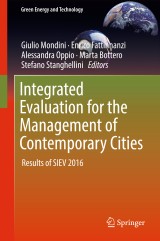Details

Integrated Evaluation for the Management of Contemporary Cities
Results of SIEV 2016Green Energy and Technology
|
213,99 € |
|
| Verlag: | Springer |
| Format: | |
| Veröffentl.: | 06.06.2018 |
| ISBN/EAN: | 9783319782713 |
| Sprache: | englisch |
Dieses eBook enthält ein Wasserzeichen.
Beschreibungen
<p>This book highlights a selection of the best papers presented at the 2016 SIEV conference “The Laudato sì Encyclical Letter and Valuation. Cities between Conflict and Solidarity, Decay and Regeneration, Exclusion and Participation”, which was held in Rome, Italy, in April 2016, and brought together experts from a diverse range of fields – economics, appraisal, architecture, energy, urban planning, sociology, and the decision sciences – and government representatives. The book is divided into four parts: Human Ecology: Values and Paradigms; Integral Ecology and Natural Resource Management; Intergenerational Equity; and How to Enhance Dialogue and Transparency in Decision-making Processes. </p>
<p>Cities are where 72% of all Europeans live, and this percentage is expected to rise to 80% by 2050. Given this trend towards urbanization, cities are continuously growing, which also entails a growing risk of social segregation, lack of security and mounting environmental problems. All toooften, today’s cities have to cope with social and environmental crises, shifting the European urban agenda towards regeneration processes. Urban regeneration is more complex than merely renovating existing buildings, as it also involves social and environmental problems, inhabitants’ quality of life, protecting tangible and intangible cultural resources, innovation and business.</p><p></p>
<p>Cities are where 72% of all Europeans live, and this percentage is expected to rise to 80% by 2050. Given this trend towards urbanization, cities are continuously growing, which also entails a growing risk of social segregation, lack of security and mounting environmental problems. All toooften, today’s cities have to cope with social and environmental crises, shifting the European urban agenda towards regeneration processes. Urban regeneration is more complex than merely renovating existing buildings, as it also involves social and environmental problems, inhabitants’ quality of life, protecting tangible and intangible cultural resources, innovation and business.</p><p></p>
<p>Human Ecology: Values and Paradigms.- Integral Ecology and Natural Resource Management.- Intergenerational Equity.- How to enhance dialogue and transparency into decision making processes.</p>
<p>This book highlights a selection of the best papers presented at the 2016 SIEV conference “The Laudato sì Encyclical Letter and Valuation. Cities between Conflict and Solidarity, Decay and Regeneration, Exclusion and Participation”, which was held in Rome, Italy, in April 2016, and brought together experts from a diverse range of fields – economics, appraisal, architecture, energy, urban planning, sociology, and the decision sciences – and government representatives. The book is divided into four parts: Human Ecology: Values and Paradigms; Integral Ecology and Natural Resource Management; Intergenerational Equity; and How to Enhance Dialogue and Transparency in Decision-making Processes. </p>
<p>Cities are where 72% of all Europeans live, and this percentage is expected to rise to 80% by 2050. Given this trend towards urbanization, cities are continuously growing, which also entails a growing risk of social segregation, lack of security and mounting environmental problems. All toooften, today’s cities have to cope with social and environmental crises, shifting the European urban agenda towards regeneration processes. Urban regeneration is more complex than merely renovating existing buildings, as it also involves social and environmental problems, inhabitants’ quality of life, protecting tangible and intangible cultural resources, innovation and business. </p><p></p>
<p>Cities are where 72% of all Europeans live, and this percentage is expected to rise to 80% by 2050. Given this trend towards urbanization, cities are continuously growing, which also entails a growing risk of social segregation, lack of security and mounting environmental problems. All toooften, today’s cities have to cope with social and environmental crises, shifting the European urban agenda towards regeneration processes. Urban regeneration is more complex than merely renovating existing buildings, as it also involves social and environmental problems, inhabitants’ quality of life, protecting tangible and intangible cultural resources, innovation and business. </p><p></p>
Covers energy, economic as well as environmental issues Presents the state of the art in the fields of urban development and sustainability Offers a special focus on European planning cultures

















